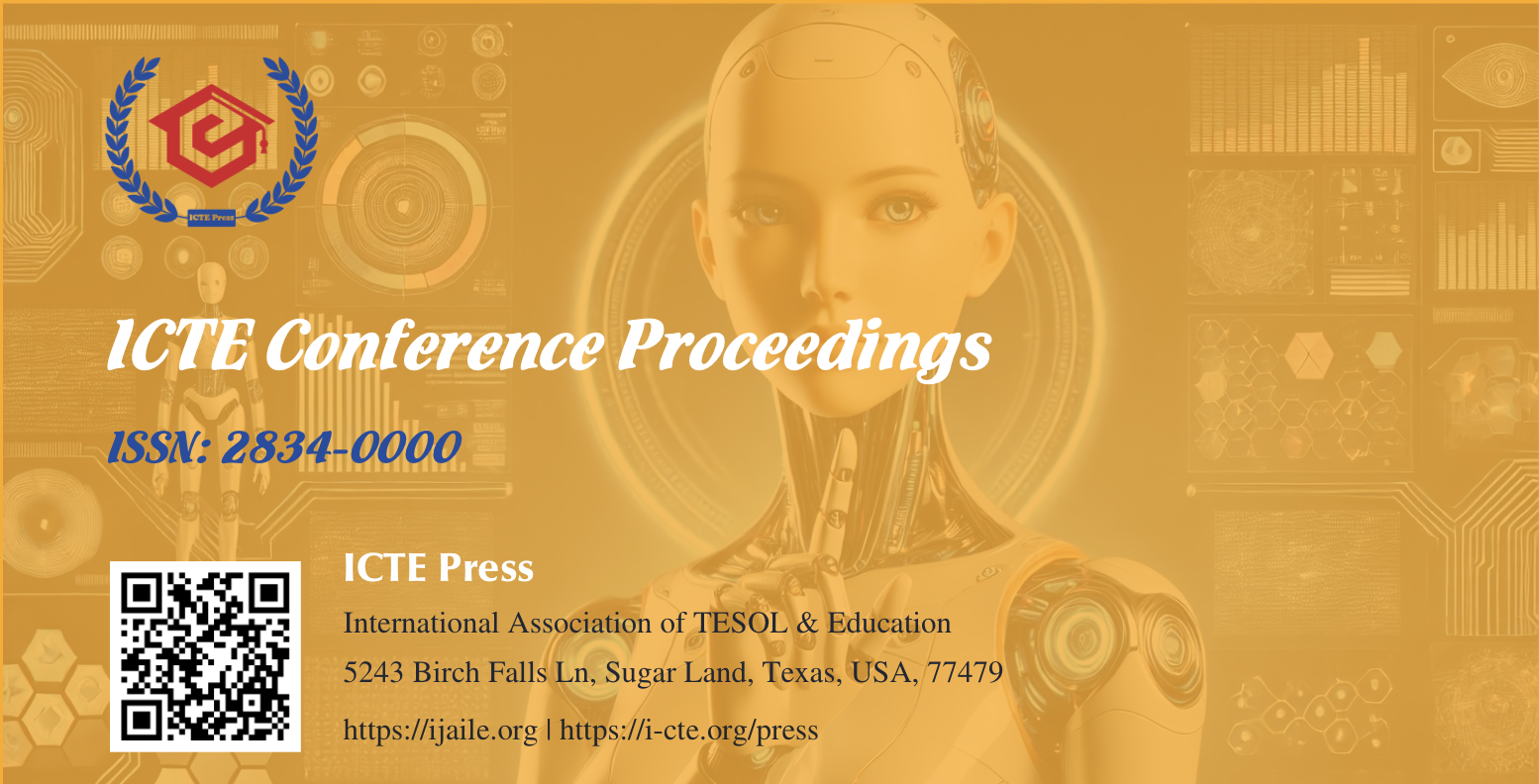The Influence of the ChatterKid App on the English-speaking Skills of Tertiary Students
DOI:
https://doi.org/10.54855/ictep.2451Keywords:
English-speaking skills, ChatterKid, English, attitudesAbstract
Educators around the world have employed different technology-based learning tools to smooth the studying experience of learners in various fields. English teaching is no exception because English is an international communication tool that is used in many countries and communities. English speaking is considered to be one of the most challenging skills that requires mastery to be fluent in English. Numerous studies have examined the advantages and drawbacks of using technology to teach English-speaking skills. However, the number of studies focusing on the ChatterKid app is limited. Based on the mentioned facts, this study was implemented to evaluate the influence of using the ChatterKid app on students’ speaking skills at Thai Nguyen University of Education in Vietnam. Ninety first-year students participated in this quasi-experimental study for 12 weeks. The tests and questionnaire were applied to collect data; SPSS analyzed the data to draw the conclusion for the study. The findings indicated that the ChatterKid app significantly improved the speaking level of students, especially fluency, and students had positive attitudes towards the use of this app.References
Alsuhaim, A. (2018). Teaching pronunciation via computer technology: principles and best Practices [Master’s thesis, University of Wisconsin-River Falls]. http://digital.library.wisc.edu/1793/77778
Asratie, M. G., Wale, B. D., & Aylet, Y. T. (2023). Effects of using educational technology tools to enhance EFL students’ speaking performance. Education and Information Technologies, 28(8), 10031-10051. https://doi.org/10.1007/s10639-022-11562-y
Aziz, A. A., & Kashinathan, S. (2021). ESL learners’ challenges in speaking English in Malaysian classroom. Development, 10(2), 983-991.
Bui, P.H., Bui, H.H.P., & Dinh, P.D. (2023). Vietnamese students’ use of smartphone apps in English learning. LEARN Journal: Language Education and Acquisition Research Network, 16(1), 28-46.
Duong, T., & Suppasetseree, S. (2024). The effects of an artificial intelligence voice chatbot on improving Vietnamese undergraduate students’ English speaking skills. International Journal of Learning, Teaching and Educational Research, 23(3), 293-321.
Hamouda, A. (2020). The effect of virtual classes on Saudi EFL students’ speaking skills. International Journal of Linguistics, Literature and Translation, 3(4), 175-204.
Hezili, Y. (2018). Teachers’ and students’ attitudes towards the role of using technology beyond the classroom in enhancing the speaking skill [Master’s thesis, University of 8 Mai 1945, Guelma]. https://dspace.univ-guelma.dz/xmlui/handle/123456789/2480
Khan, R. M. I., Radzuan, N. R. M., Farooqi, S. U. H., Shahbaz, M., & Khan, M. S. (2021). Learners' perceptions on WhatsApp integration as a learning tool to develop EFL vocabulary for speaking skill. International Journal of Language Education, 5(2), 1-14.
Khanh, C. G. (2021). The effect of ICT on learners’ speaking skills development. International Journal of TESOL & Education, 1(1), 22–29.
Lai, T. T., Lien, N. T. H., & Vu, N. N. (2021). Flipgrid app for teaching speaking skills: students’ perceptions and performance impact. VNU Journal of Foreign Studies, 37(6), 155-167.
Le, H. H. V., & Doan, T. K. O. (2023). EFL students’ perceptions of using Nearpod in online English learning. ICTE Conference Proceedings, 3, 98–117. https://doi.org/10.54855/ictep.2338
Luu, L. P. T., Nguyen, T. N. Q., Vo, N. T. T., & Nguyen, M. T. H. (2021). The need of applying English learning apps to help Van Lang University students improve their spoken English performance. AsiaCALL Online Journal, 12(2), 72-86.
Mustafa, E. N. E. (2018). The impact of YouTube, Skype and WhatsApp in improving EFL learners’ speaking skill. International Journal of Contemporary Applied Researches, 5(5), 18-31.
Ngoc, N. K., & Thanh, N. T. M. (2023). Tertiary students’ perceptions on Elsa Speak Application for pronunciation learning. European Journal of Applied Linguistics Studies, 7(1), 1-13.
Nguyen, T. T. H. (2021). Implementing digital techniques to stimulate EFL students’ engagement: A case study in Vietnam. International Journal of TESOL & Education, 1(3), 105-129. https://i-jte.org/index.php/journal/article/view/81
Nguyen, T. T. V., & Tran, T. T. M. (2024). Exploring Student’s Perspectives and Practices: Using TikTok in the Context of Sophomore EFL Speaking 4 Learning at Van Lang University. International Journal of TESOL & Education, 4(2), 160-182. https://doi.org/10.54855/ijte.24429
Phuong, T. T. N., & Ngoc, N. T. B. (2023). The influence of shadowing technique on students’ speaking skill at thai nguyen university of education. TNU Journal of Science and Technology, 228(12), 481-485. https://doi.org/10.34238/tnu-jst.8657
Qizi, R. M. A., & Qizi, M. F. M. (2024). The benefits of using innovative technology in education. Science and Innovation, 3(18), 469-471.
Ralph, R., Code, J., & Petrina, S. (2023). Measuring theory of mind (ToM) with preschool-aged children: storybooks and observations with iPads. International Journal of Early Years Education, 31(1), 251-268.
Rintaningrum, R. (2023). Technology integration in English language teaching and learning: Benefits and challenges. Cogent Education, 10(1), 2164690.
Sosas, R. V. (2021). Technology in teaching speaking and its effects to students learning English. Journal of Language and Linguistic Studies, 17(2), 958-970.
Thuong, L., & Tham, D. (2023). Students’ attitudes towards using Mobile applications in learning English listening skills at Ho Chi Minh City University of Foreign Languages and Information Technology. VNU Journal of Science: Education Research, 39(2). https://doi.org/10.25073/2588-1159/vnuer.4703
Downloads
Published
How to Cite
Issue
Section
License
Copyright (c) 2024 Tran Thi Nam Phuong

This work is licensed under a Creative Commons Attribution 4.0 International License.
Authors retain copyright and grant the picte the right of first publication with the work simultaneously licensed under a Creative Commons Attribution 4.0 International License that allows others to share the work with an acknowledgment of the work's authorship and initial publication in this journal.
Authors are able to enter into separate, additional contractual arrangements for the non-exclusive distribution of the proceedings' published version of the work (e.g., post it to an institutional repository, in a journal, or publish it in a book), with an acknowledgment of its initial publication in this proceedings.
Authors are permitted and encouraged to post their work online (e.g., in institutional repositories or on their website) prior to and during the submission process.










